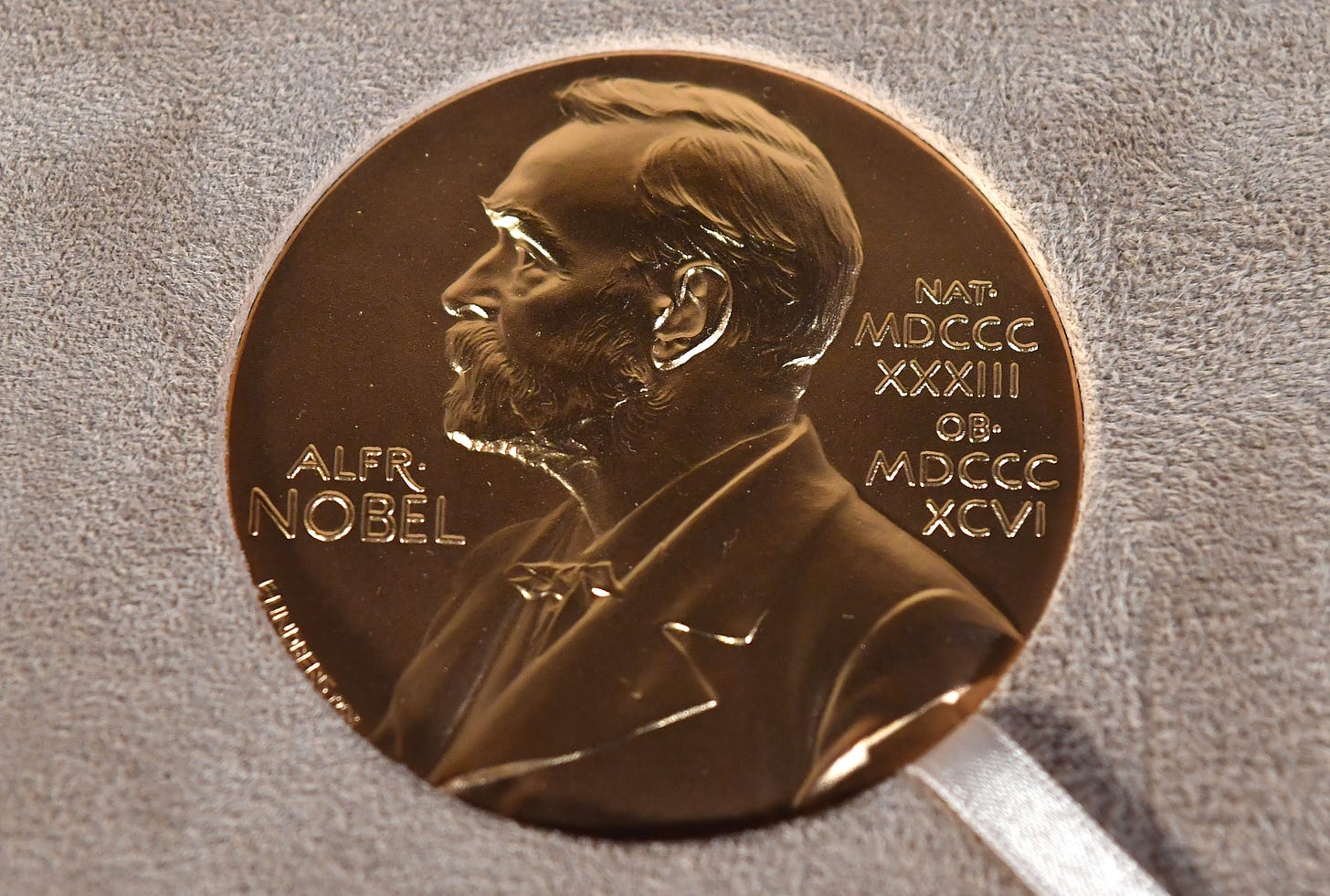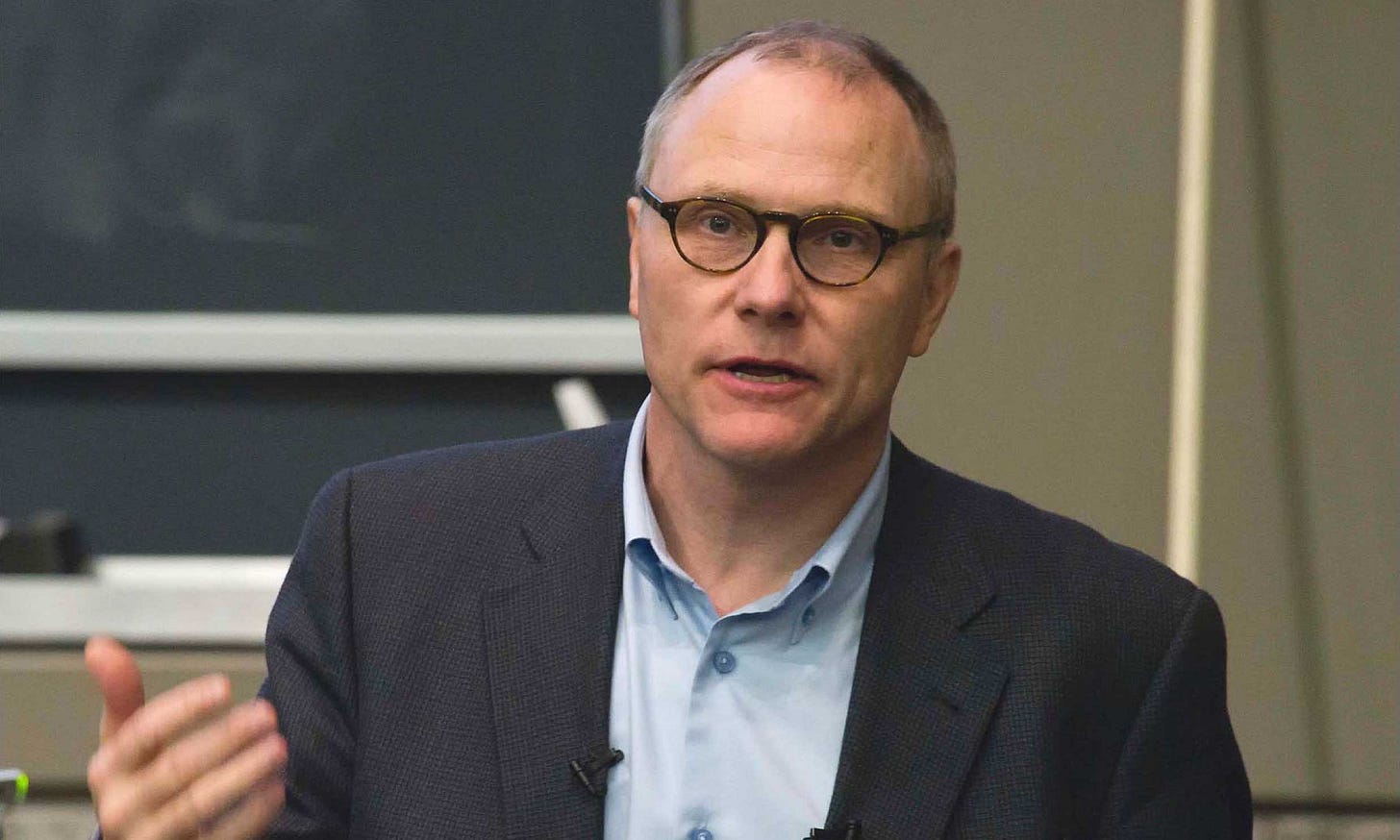The New Nobel Prize, Milton Friedman and the Trouble with Economics
If you don't know, now you know. Or do you?
One of my favorite Milton Friedman lines is about free trade, from a 1980 book called Free to Choose that he wrote with his wife Rose:
"Ever since Adam Smith there has been virtual unanimity among economists, whatever their ideological position on other issues, that international free trade is in the best interests of trading countries and of the world. Yet tariffs have been the rule."
I love this quote because it is one of Friedman's least controversial views. Both sentences are true in a strict, narrow reading (or at least were in 1980). It is not Friedman the right-wing ideologue but Friedman the common-sense educator, explaining a bedrock economic idea to newcomers. The value of free trade wasn't a left-wing or a right-wing idea -- it was just economics, neutral, mathematical, scientific, empty of ideology.
And yet Friedman's seemingly simple, uncontroversial claim in fact poses a series of very difficult intellectual problems. At best, it's a nasty theoretical muddle. At worst, it's completely wrong. Whatever shade of trouble you settle on, Friedman's statement demonstrates very powerfully just how slippery even rudimentary concepts in economics can become when you investigate their history.
First, how did Adam Smith know that tariffs were bad? The Wealth of Nations was published in 1776. Simon Kuznets did not develop the concept of Gross Domestic Product until 1934. Reliable data on prices, sales, wages, employment and output simply didn't exist in Smith's day and wouldn't exist for more than a century. We can talk meaningfully about why Adam Smith believed tariffs were troubling, but how could he know such a thing if basic tools of economic study were not available to him?
The simple answer is that he didn't know -- not in any sense that would hold up to contemporary scientific scrutiny. Smith instead established a plausible theoretical framework, and told a compelling story about how trade worked, the same way Thomas Hobbes and Jean-Jacques Rousseau philosophized on the origins of civilization and political legitimacy. Once you accepted that the system worked the way Smith said it did, the conclusions followed from his premises. Its persuasive power comes from Smith's literary and philosophical prowess, not his statistical aptitude.
So while Friedman is correct to say that economists since Adam Smith have generally advocated for free trade, whether they actually knew what they were talking about is a much more complicated matter.
This knowledge problem bleeds into our second problem, namely that objections to tariffs changed over the 200 years between Smith and Friedman. Smith saw tariffs as a counterproductive form of government favoritism. He didn't like the idea of monarchs meddling with the purchasing choices of the public, and there were good reasons to believe that the priorities of princes were not aligned with the public good. By restricting the trading demands of the people in favor of imperial preference, tariffs all but guaranteed waste and inefficiency.
This theoretical objection, moreover, was tempered in practice. In his dozen years as a customs commissioner in Scotland, Smith approved tariffs for the sake of raising revenue for public works and other government functions, though he tried not to treat different countries and producers differently, so as to limit the overall distortion imposed on the market by his intervention. It's still true that he didn't like tariffs, but Smith's disapproval did not approach the intensity of former Trump National Economic Council Director Gary Cohn, who quit the administration in 2018 to protest the administration's turn against free trade.
Smith, moreover, is not the author of the classical case for free trade that we all learn in Econ 101. That doctrine -- that economic specialization always allows a nation to increase its prosperity so long as it can produce the good in question at a lower opportunity cost than its trading partners — arrives in 1817 with David Ricardo. There is an obvious harmony between Smith's invisible hand and Ricardo's comparative advantage, but they are different ideas, and the concepts we rely on when we talk about international trade or "free" trade have continued to shift over the ensuing centuries.
By the time Friedman's essay was republished by the Hoover Institution at Stanford in 1997, for instance, free traders weren't so much concerned with tariffs as they were with government regulations and other bureaucratic operations that could serve a tariff-like function. An environmental regulation prohibiting the mining of some toxic chemical, for example, might really be a tool for restricting foreign investment. By the 1990s, when public officials and famous economists talked about free trade, they were talking about a pretty broad and detailed vision of government that simply wasn't contemplated by Enlightenment philosophers. The prescription drug patent monopolies mandated by WTO treaties don't have much to do with Adam Smith's defense of free trade.
The more we study trade, in fact, the more complex our understanding becomes. In the 1930s and 1940s, John Maynard Keynes argued that the true material benefits of free trade had been vastly overstated. In the 1970s, Paul Krugman made a similar point (and a few more!) with a much more rigorous empirical look at trading patterns and better mathematics. And in 2016, economists David Autor, David Dorn and Gordon Hanson published "The China Shock," showing that contrary to economists' expectations, bringing China into the WTO had in fact destroyed a significant number of U.S. manufacturing jobs and reduced rather than improved living conditions across large swaths of America.
Friedman of course wasn't trying to con anybody about the WTO in 1980, because the WTO didn't exist. He was just stating the consensus of the profession. But we can see that his straightforward point about Adam Smith, economists and trade is a real intellectual debacle. Where Friedman describes a unity of purpose across centuries, we have instead a long process of change and variation.
Today the latest Nobel Prize in Economics was awarded to David Card, Joshua Angrist and Guido Imbens for separate efforts to improve the empirical rigor of economic knowledge. Noah Smith has a nice rundown of the winners and their methodological achievements, but the common theme is that they all tried to get away from reasoned intuition and enable the field to conduct more and better real-world experimentation.
In 1994, Card and his co-author the late Alan Krueger published a study concluding that increasing the minimum wage in New Jersey had not constrained employment. If anything, it had actually increased the number of jobs. This was supposed to be impossible. Everybody knew that the more you paid people to do a job, the fewer people you could pay. Here's a James Buchanan quote Noah dug up blasting the Card-Krueger paper: "Just as no physicist would claim that 'water runs uphill,' no self-respecting economist would claim that increases in the minimum wage increase employment. Such a claim, if seriously advanced, becomes equivalent to a denial that there is even minimal scientific content in economics."
Buchanan's reasoning here is pretty compelling. He says we must reject a thorough new empirical study on the grounds that it contradicts the longstanding consensus of the economics profession. If the study is true, Buchanan argues, it will make a mockery of the profession's claims to scientific merit -- it has been wrong about something very basic for a long, long time.
Today of course economists generally accept that Card and Krueger were right and Buchanan was wrong. And it's really nice to see Card get a Nobel for sticking his neck out on behalf of scientific rigor. He was really sticking out his neck -- look at this maniacal statement from The New York Times Editorial Board in January 1987: "The Right Minimum Wage: $0.00."
I agree with today's consensus that more empiricism in economics is a good thing. But it's essential to understand just how much of the profession is based on ideas that either don't or can't stand up to scientific scrutiny. Economists at the Fed have been poking holes in very basic inflation concepts -- the neutral rate of interest, the natural rate of unemployment, inflation expectations -- since at least 2017. A recent attack on inflation expectations is so serious that The Times concluded "Nobody Really Knows How The Economy Works."
But it's also a mistake to believe that more empiricism will inevitably lead to better economics. Buchanan was right that economists had long been settled on the existence of a tradeoff between jobs and wages -- but they hadn't always been. John Maynard Keynes rejected it as early as the 1920s, and the growth of minimum wage law over the 1930s and 1940s was not simply a political response to unreasoning popular demand. For a time, plenty of economists agreed that higher wages didn't inevitably destroy jobs. That view was eventually displaced by a view that turned out to be completely wrong, even as the empirical and mathematical rigor of the economics profession was improving.
Most of the time, however, we suffer from an opposite malady -- we don't think to study elements of our own conventional wisdom until they blow up in our faces. That is one reason why major changes in economic thought tend to arise not from careful improvements in the quality of data over the course of decades, but in fits and starts as thinkers and policymakers respond to unexpected crises. Sometimes the field takes very big and bad steps backwards in this process. There's no law that ensures every politically convenient solution will lead to any deeper lasting knowledge of how the world works.
We’re in a period of transition for macroeconomics in particular. I’m optimistic about the intellectual shift taking place around money, trade, government debt, interest rates, public investment and more. The field may be able to do much good for the world in this process, but we won’t know what it gets wrong until the next crisis.






